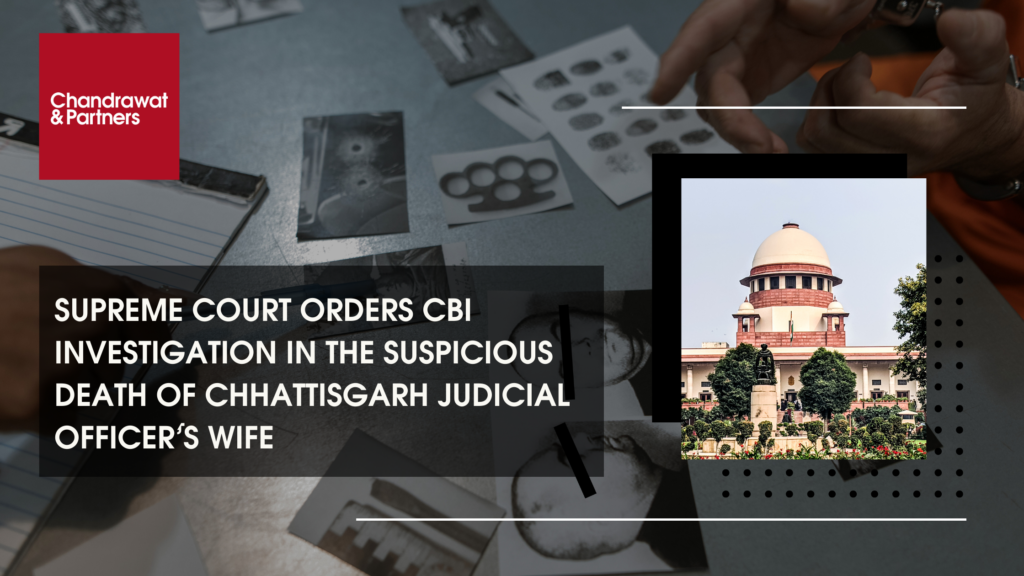Home > Recent Judgements > Supreme Court Orders CBI Investigation In The Suspicious Death Of Chhattisgarh Judicial Officer’s Wife
Sept 11, 2024

SUPREME COURT ORDERS CBI INVESTIGATION IN THE SUSPICIOUS DEATH OF CHHATTISGARH JUDICIAL OFFICER’S WIFE
The Supreme Court of India has taken a significant step toward ensuring justice in the case of Mandakini Diwan and Anr. v. The High Court of Chhattisgarh & Ors, by directing the Central Bureau of Investigation (“CBI”) to take over the probe into her mysterious death. The Court’s decision comes after nearly eight years of uncertainty and allegations of bias, raising important questions about the conduct of local law enforcement and the need for impartial investigation in cases involving influential individuals.
BACKGROUND OF THE CASE
The appellants, who are the family members of the deceased, raised concerns regarding the death of the victim who was respondent’s wife, which occurred under suspicious circumstances in 2016. The respondent, a senior judicial officer, had reported the death as a suicide. However, the appellants suspected foul play, citing delayed access to the post-mortem report and unexplained injuries on the deceased.
Despite their concerns, the local police closed the case as a suicide, prompting the appellants to seek legal recourse. They initially approached the Chhattisgarh High Court, which granted them the option to file a complaint under Section 156(3) of the Code of Criminal Procedure (CrPC), allowing for a magistrate-directed investigation.
SUPREME COURT INTERVENTION
Unhappy with the High Court’s ruling, the appellants approached the Supreme Court, citing fears that a fair investigation would be compromised due to respondent’s position as a judicial officer. The petitioners highlighted key findings in the post-mortem report, including six ante mortem injuries on victim’s body, which had not been adequately explained.
During the hearings, the Solicitor General of India, suggested that the Supreme Court could appoint a Special Investigation Team (SIT) or transfer the case to the CBI to ensure transparency and restore public confidence. The Supreme Court bench deemed it appropriate to order a CBI investigation, acknowledging the potential influence of the respondent due to his judicial status.
WHY A CBI INVESTIGATION?
The Supreme Court’s order emphasized the need for an independent and impartial investigation, particularly in cases where concerns of bias and undue influence have been raised. The appellants contended that the respondent, due to his position as a senior judicial officer, might exert influence over the local authorities, thereby affecting the integrity of the investigation.
Given these concerns, the Court deemed it appropriate to assign the investigation to the CBI. This move aims not only to address the appellants’ apprehensions but also to ensure transparency and fairness, reinforcing the broader public’s trust in the justice system.
LOOKING AHEAD: A QUEST FOR JUSTICE
The Supreme Court directed the CBI to conduct the investigation expeditiously and report its findings. The state of Chhattisgarh has been ordered to cooperate fully with the agency, providing all necessary documents and support to facilitate the investigation. Importantly, the Court clarified that it has not made any comments on the merits of the case and that the CBI should carry out its investigation free from any influence.
This ruling not only brings renewed hope to victim’s family but also sets an important precedent for ensuring fair investigations, especially in cases involving influential individuals. It underscores the critical role that independent agencies like the CBI play in maintaining public trust in the legal process, particularly when questions of bias or misconduct arise.
CLOSING REMARKS
The Supreme court’s decision to hand the investigation to the CBI highlights the delicate balance between maintaining public trust and ensuring that the judiciary is not beyond scrutiny. This case may set a precedent for other investigations where judicial officers or high- ranking officials are involved. The outcome could also lead to broader discussions about the role of local police forces and their capacity to investigate cases impartially when dealing with influential individuals. Ultimately, the ruling underscores the need for mechanisms that can safeguard transparency and fairness in India’s justice system.
For more information or queries, please email us at
enquiries@chandrawatpartners.com




